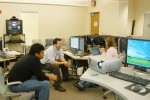Information technology training and usability lab begins hosting workshops at LNO
The LTER Network Office (LNO) is in the process of completing the installation of a laboratory for informatics training and usability testing. LNO associate directors Bill Michener and James Brunt designed the lab to be more functional than traditional computer classrooms. The lab boasts comfortable, clustered seating and large, dual, LCD color monitors. Designed to be more functional than traditional computer classrooms, the laboratory eliminates visual barriers and rows and aisles that impede personalized instruction. Although the audiovisual system has not been completed, the lab has been used for five intensive training sessions since computers were installed in October 2004 (see Table 1). The lab is funded through the NSF’s SEEK grant and the University of New Mexico and is operated by LNO and SEEK personnel.
The first official training at the Informatics Training and Software Usability Testing Laboratory was held in October 2004. The new, state-of-the-art facility is equipped with 21 top of the line Dell PC’s with dual 19-inch flat panel displays. The lab is organized in four pods, each with five systems surrounding the instructor station at the center of the lab. Each system runs on Microsoft Windows XP Professional and is equipped with the appropriate productivity office software tools, database management tools, anti-virus scanner, adware/spyware blocker, firewall, and other utility software. Training-specific software can be added on request. The instructor station is further equipped with dual high resolution LCD projectors. The systems are all connected via wired Gigabit network, and high-speed wireless connectivity is provided for user mobile devices. The lab is also equipped with screen recording and capture software to help collect usability information. Work is underway to provide instructor console-managed facilities for video tele-conferencing, DVD and VHS playback, LCD projection, and instructor-to-trainee station cloning for guided training and demonstration techniques.
Table 1 - Recent Training in LNO Information Technology Training and Usability Lab
| Training | Group |
| Informatics training for biological field station personnel | Resource Discovery Initiative for Field Stations (RDIFS) |
| Biodiversity and Ecological Analysis and Modeling (BEAM) | Science Environment for Ecological Knowledge (SEEK) |
| Early Career Faculty and Postdoctoral Training | Science Environment for Ecological Knowledge (SEEK) |
| Data Management Tools Workshop for LTER information managers | Knowledge Network for Biocomplexity (KNB) |
| Data Discovery in the Biological Sciences | Resource Discovery Initiative for Field Stations (RDIFS) |
Five training courses have been held since the lab opened. These trainings are geared toward introducing the general concepts of ecoinformatics to information and data managers at field stations, and academic faculty in ecology and biology. Over the past year and a half LNO, in conjunction with National Center for Ecological Analysis and Synthesis, has conducted nine on-site trainings. Below are brief descriptions of some of the trainings offered:
OBFS Resource Discovery Initiative for Field Stations
A two-week workshop to help field station and data managers acquire the skills and tools of ecoinformatics for data acquisition and archiving, and to apply these skills to managing ecological data at field and marine stations across the country. Participants learn how to design dynamic websites, employ advanced wireless networking technologies, use Morpho to create Ecological Metadata Language (EML), and get ESRI (Environmental Systems Research Institute) certification in ArcGIS. More than 50 data and field station managers have received this training over the past two years.
KNB Data Management Tools
A three-day intensive workshop to give ecologists, biologists, and data managers hands-on experience using some of the ecoinformatics tools created under the Knowledge Network for Biocomplexity Project (http://knb.ecoinformatics.org) and to apply these skills to managing ecological data at field and research stations across the country. Participants get hands-on experience with Morpho metadata software, KNB data registry page, Ecological Metadata Language (EML), and Metacat. More than 50 ecologists, biologists, and data managers have received this training over the past year.
The Early Career Faculty and Postdoctoral
A one-week workshop to help early career faculty and postdoctoral associates incorporate ecoinformatics concepts and tools in their research and teaching. Participants receive hands-on experience using emerging technologies from the SEEK project (http://seek.ecoinformatics.org/)—such as Kepler system for scientific workflows, EcoGrid, as well as other database and metadata management software and wireless technologies. About 30 early career faculty in biology, ecology, and related fields have received this training thus far.
Laura Downey, Senior Usability Engineer on the SEEK project at LNO, is using these trainings to conduct a variety of usability activities to help gauge users’ needs and to improve our software tools. To date, Laura has gathered usability data on Kepler, Morpho, and the KNB data registry pages.
Samantha Romanello SEEK Project, LNO

 Enlarge this image
Enlarge this image